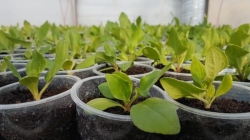A UPT project has established which is the most suitable plant for treating soils polluted with heavy metals
A UPT project has established which is the most suitable plant for treating soils polluted with heavy metals
The closure of mining operations in the Banatul Montan area has led to the need to heal the land affected by mining activities, but also to rethink economic strategies in the area. Politehnica University Timișoara (Romania) and the Bor Institute of Mining and Metallurgy (Serbia) carried out a project aimed at testing green solutions for remediation of soils contaminated with heavy metals and arsenic due to mining operations. The project established which are the more suitable plants for the soil's decontamination.
The closing conference of the project "Forming a network for enhancing environmental protection from pollutants of mining cross border areas", acronym NETMIN, eMS no. RORS-308, implemented within the Interreg-IPA Romania-Serbia Cross-Border Cooperation Program by Politehnica University Timisoara (Romania) and the Bor Institute of Mining and Metallurgy (Serbia) took place online at the beginning of December 2020, marking an end of the stage. The total budget of the project is EUR 301,480.20, of which the European Union finances EUR 256,258.16, the Government of Romania EUR 19,870.83, and the rest represents the contribution of the project partners. In addition to research and expansion of knowledge on soil decontamination through green technologies, the network supports the development of sustainable policies in the use of natural resources, improving population health, and protecting flora and fauna in the Romania-Serbia cross-border area.
Despite the difficulties created by the outbreak of the COVID-19 pandemic, the objectives of the project, carried out over 18 months, were fully achieved. 16 workshops were organized alternately in Romania and Serbia, two of which including training sessions for young researchers. The agreement reached for the establishment of the education and research network provided in the project attracted almost 300 members. For the bioremediation of soils polluted with heavy metals and arsenic due to mining activities in Banat, respectively - in the Bor area, Serbia, where the copper mine is still active, two plants were tested (in laboratory conditions), namely barley and bucket plant. The cup plant has proven to be very effective for bioremediation, being a plant that could be used to create biogas, with a positive economic impact on areas where soils, due to pollution, cannot yet be used for agricultural purposes. The results obtained were widely communicated both in the area of scientific research, through published articles and to the public in the area of interest, through the distribution of leaflets and brochures, through media campaigns and on the occasion of workshops, organized initially face-to-face and online, when the restrictions related to the sanitary security imposed this.
The project provided an opportunity to strengthen cross-border relations and complementarity between scientific and applied research concerns of specialists in Timisoara (Romania) and Bor (Serbia), attracting local communities in the implementation of a network of sharing experiences on solutions to mitigate the negative effects of mining activity on soils, but also on the quality of the environment and human health. Over the next five years, the network created will act to ensure the sustainability of the project, aiming, among other things, to attract funds for bioremediation solutions of polluted soils in mining areas to be implemented.
















